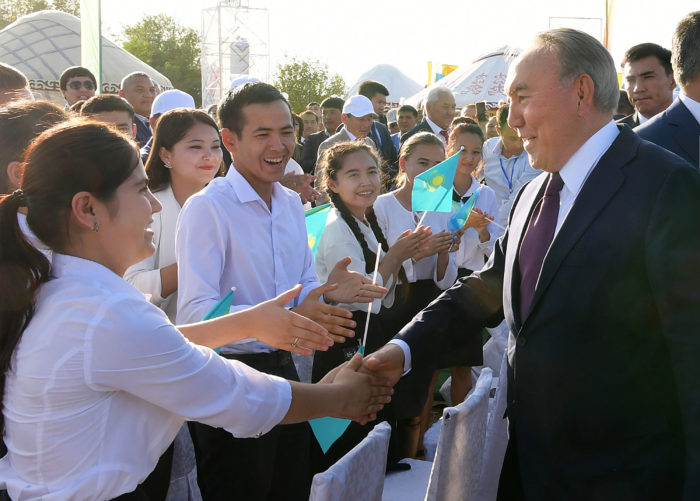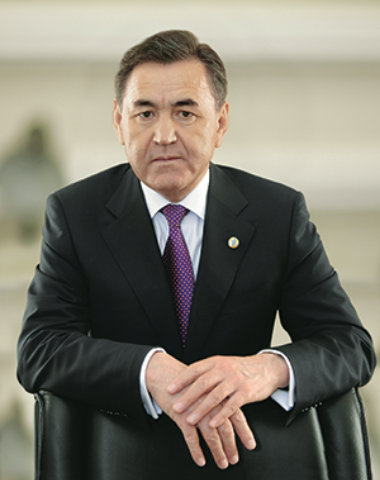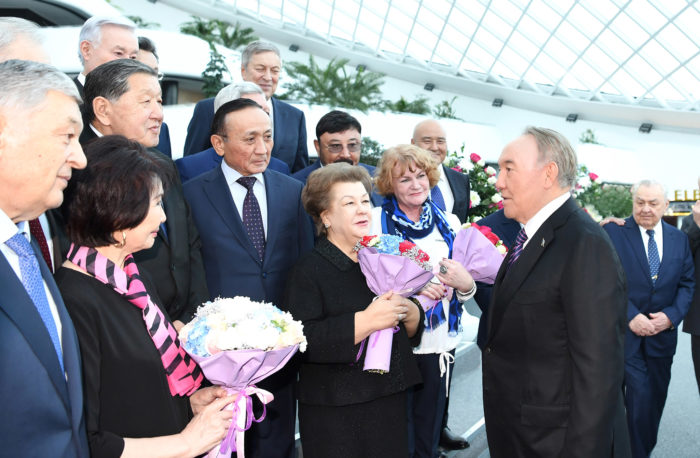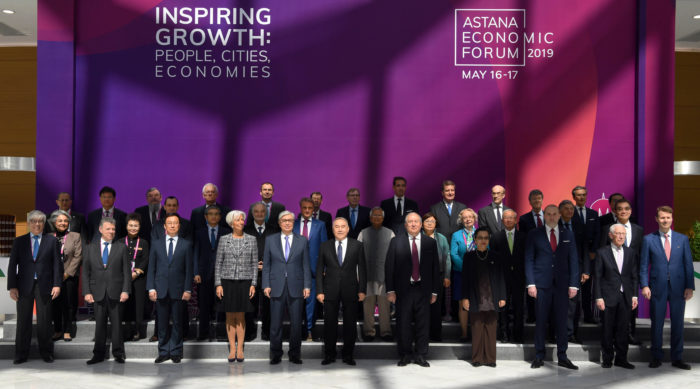Kazakhstan’s way or the Kazakhstan’s development model – these are what foreign experts call the successful measures taken to ensure national modernization and the evolutionary transformations inspired by Nursultan Nazarbayev, Kazakhstan’s First President who is expected to turn 80 on July, 6, 2020.

Photo credit: Elbasy.kz.
He met with world-famous reformers such as the former prime ministers of Singapore – Lee Kuan Yew, Great Britain – Margaret Thatcher, Malaysia – Mahathir Mohamad, as well as prominent experts on the economy of the Western world, he was interested in how their reforms were carried out, what challenges and problems they had to face and how they were overcome.
Nazarbayev chose to make economic development his platform, rightly believing that only a society with a high standard of living is capable of adopting democratic values. During Kazakhstan’s difficult first years of sovereignty, this proved to be the correct approach. This became the Nazarbayev formula: economy first, politics second.

Makhmud Kassymbekov
By 1991, Kazakhstan inherited from the USSR an unbalanced economy, which was, in fact, a raw material appendage of the much larger planned economic system. The collapse of close economic ties between the former Soviet republics led to a deep, seemingly irreversible, socio-economic crisis. The First President went on to make decisive market reforms, sometimes unpopular and tough, but only in that way was it possible to ensure the growth of the economy and to create a stable middle class, a pillar of a stable society. In the twentieth century, interethnic tensions became one of the main causes of the collapse of empires and allied states. Recognizing the crucial importance of this factor, the First President proclaimed the equality of rights of all Kazakh people, regardless of ethnic and religious affiliations, as one of the fundamental principles of state policy. Strict adherence to this postulate allowed Kazakhstan to maintain its peace, tranquility, political stability, interethnic and interfaith harmony. Ethnic diversity has become the country’s greatest strength.
Step by step, through the efforts of the First President, Kazakhstan has rebuilt on the ruins of the former Soviet state. During the first stage of modernization, as Nazarbayev described this period the President worked to effect a system overhaul, restore the economy and form a new political system.
Over the years, Kazakhstan has managed to build an integrated planning and decision-making system capable of forming long-term strategies and concrete action plans – all integrated into one single structure. The Kazakhstan 2030 strategy was aimed at helping Kazakhstan join the list of the 50 most competitive states on the planet. First met with scepticism, the plan is now proceeding ahead of schedule.
The Kazakh leopard jumped and with it, stable economic growth was ensured, along with the modernization of the economy. Promoting entrepreneurship became one of the key factors in economic development. The level of social welfare of the average citizen has grown and a stable middle class has developed. The consistent combination of economic and political reforms contributed to the further development of civil society institutions – political parties, non-governmental organizations and non-governmental media.
The transfer of the capital to Astana, now Nur-Sultan, was a turning point and key to consolidating the strategic course Nazarbayev had for the transformation of the country. The construction of a new administrative and political center caused a great multiplier effect, which had a beneficial effect on the development of all of Kazakhstan and all sectors of the economy and society. Reforms accelerated, state power was strengthened, and international cooperation intensified.

Nursultan Nazarbayev met with the first builders of the capital city at the exhibition dedicated to the history of the city’s formation and growth on Dec. 10, 2019. Photo credit: Elbasy.kz.
All regional centers were transformed using the capital as an exemplar. Particularly large changes affected the ancient city of Turkestan, which in accordance with the decree of the First President in 2018 acquired the status of an administrative center in the Turkestan region.
One of the important aspects of the activities of Nazarbayev was the formation of a new generation of managerial personnel in Kazakhstan. Over the years, he managed not only to educate the next generation of post-Soviet statesmen of the country who took over leadership of the government and the regions or became the first corps of diplomats headed by the President of Kazakhstan Kassym-Jomart Tokayev, but, most importantly, he ensured the smooth transit of power strictly within the framework of the constitutional field.
Seeing the urgent need to adapt the country to new challenges and strengthen its global competitiveness, the First President initiated the Kazakhstan 2050 strategy.
This program was designed to help Kazakhstan develop into one of the 30 most developed countries in the world and launched the systemic modernization of Kazakhstan’s economy and its political/public spheres. Five institutional reforms later and the Nation’s 100 Concrete Steps Plan aimed at modernizing the state administration apparatus, improving the work of civil and legal institutions, and further industrializing the economy was implemented. At the same time, as a result of the continuation of the program of promoting industrial and innovative development in the country, over a thousand new industries were created, while new areas and segments of the innovative economy were formed.

Nursultan Nazarbayev took part in the XII Astana Economic Forum on May 19, 2019. The annual forum, which is considered a key economic event in Eurasia was dedicated to the inspiring growth of people, cities, and economies. Photo credit: Elbasy.kz.
According to Nazarbayev, the ongoing process of transformation of the country should be accompanied by a change in public consciousness. As he repeatedly emphasized, it is important for Kazakhstan not to get lost in the rapid stream of globalization and maintain its identity while moving along the road of progress.
Throughout his years leading the country, he proved himself to be a true patriot of his native language, culture and history, which were always a core part of his vision.
The provisions were formulated by Nazarbayev in the national ideology titled Modernization of Kazakhstan’s Identity and they focused on the importance of preserving the spiritual heritage, the national code and the continuity of generations. This became the basis of national instruction for the youth.
From the very beginning of independence, the First President attached exceptional importance to the sphere of foreign policy. Effective diplomacy has become one of Kazakhstan’s key tools in ensuring the sovereignty and security of Kazakhstan and the consistent promotion of the country’s national interests. Given the realities of the modern multipolar world order, he established international contacts and ties, formed a foreign policy on the principles of multi-vector cooperation and pragmatism.
Despite various promises and exhortations, he decided to attain security not by pursuing a nuclear state, but a responsible state. Having closed the world’s largest Semipalatinsk nuclear test site and abandoned the nuclear weapons program, Nazarbayev carried out a truly great act of history, showing an example of his peace-promoting policy with his actions and his decision to denuclearize Kazakhstan.
Due to close international cooperation and partnerships built by his efforts, Kazakhstan has achieved remarkable results. Constructive and reliable relations were established with all neighboring countries. For the first time in history, Kazakhstan gained internationally recognized borders along its entire perimeter. This was a key and decisive achievement, marking a particularly important milestone in the construction of the state.
The pragmatic approach of the First President to the establishment and development of bilateral state cooperation and international cooperation ensured the achievement of mutually beneficial agreements, attracting billions of dollars of investment into the national economy.
Nazarbayev became the main inspirer and organizer of integration processes in Eurasia. Nazarbaev was deeply convinced of the need for broad economic integration of states on the continent and he consistently pursued the practical implementation of his vision. Its institutional expression became the Eurasian Economic Union, a powerful integration association of member countries for the free movement of goods, services, capital and labor.
According to many politicians and public figures, Nazarbayev is one of the few world leaders recognized for his truly global way of thinking. A peaceful and stable Kazakhstan with a consolidated society and a united people, open and aspiring to greater progress, is all a result of the work of the First President, whose greatness and depth of personality will only be more appreciated in time as his legacy solidifies.
Author is Makhmud Kassymbekov, Head of Administrative Office of First President of Kazakhstan – Elbasy, Doctor of Political Sciences, Professor.

